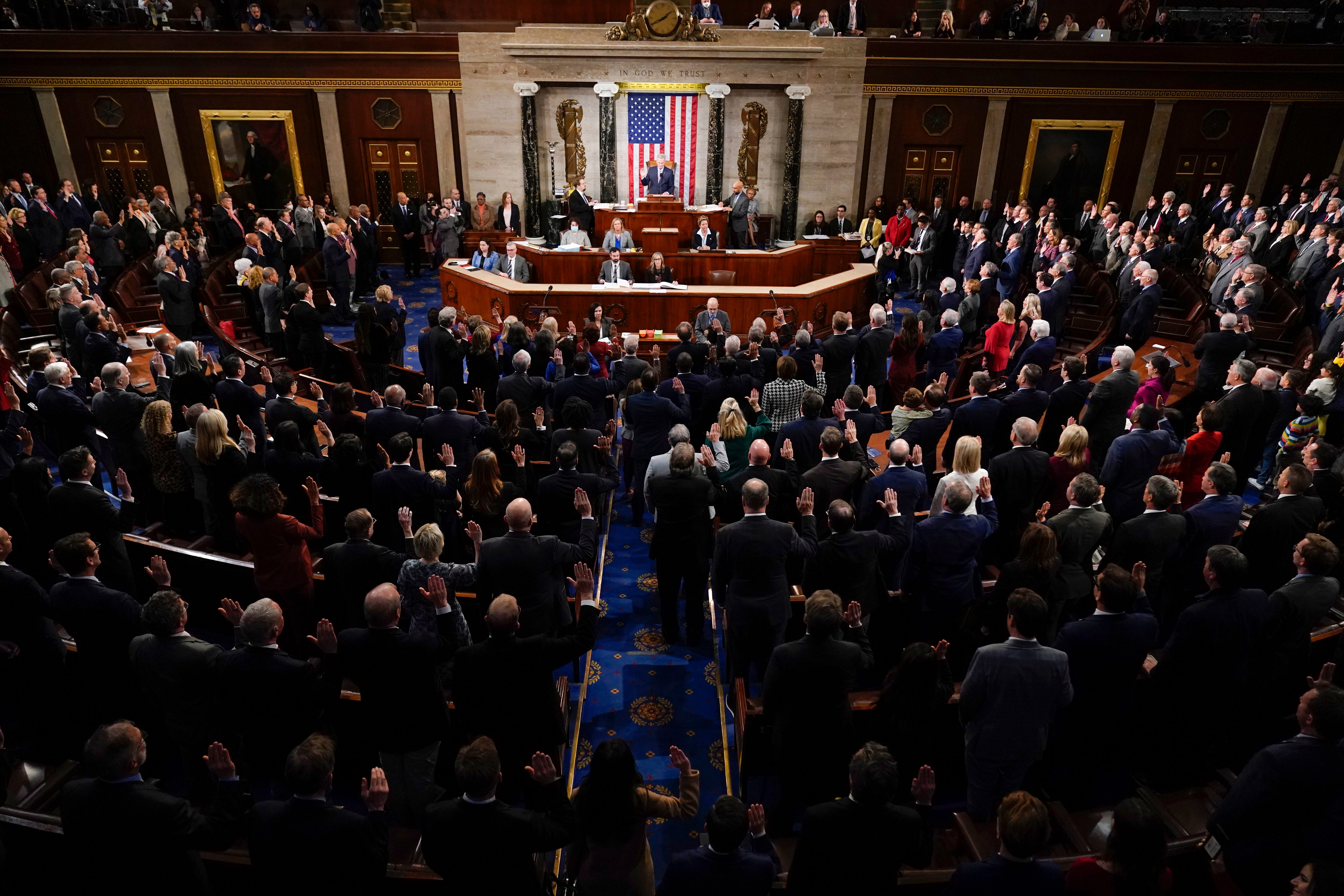Trump, in-fighting and division: A new session of Congress – but the same old problems for the Republicans
Speaker Kevin McCarthy is tasked with holding his party together in the House of Representatives – but the GOP look short of a plan, writes Chris Stevenson


“It’s nighttime here in Washington,” the new Republican speaker of the House of Representatives, Kevin McCarthy, said after finally making it through a 15th vote of members, “but in some ways, it’s also a new beginning – a fresh start.”
Having started the week with around 20 holdouts within his own party, stopping him from getting to the 218 votes needed to take the speakership, McCarthy ended it with six of those voting merely “present” – which lowered the threshold he needed – and he squeaked through with 216 votes. In the last ballot, no Republican voted against the new speaker. McCarthy can spin the beginning of the 118th Congress as a fresh start, with the Republicans having retaken control of the chamber, but the fractured nature of his party means that governing effectively will be difficult.
Let’s start with what McCarthy has had to give away to ensure he became speaker. The easiest way to understand the impact is the agreement to reduce what’s called the “motion to vacate”. Essentially, one legislator could trigger a vote to remove the speaker. That would restore the measure back to what it had previously been before the speakership of McCarthy’s predecessor Nancy Pelosi, where a motion to vacate could be offered on the House floor only “by direction of a party caucus or conference”. Given the polarised nature of current US politics, there was a definite argument for the ability to call a vote to be made more difficult.
The current Republican rules allow for a majority of House Republicans to trigger the “motion to vacate”. McCarthy had originally offered for the number to be reduced to five members of the House, but as he struggled to get over the line across various speaker votes, that number had to come down. If this “rule of one” is brought in when Congress reconvenes next week, it is something that will be hanging over McCarthy’s head for the whole of his speakership – and the threat of it would be easy to raise against him. The various holdouts to a McCarthy speakership – who became known as “never Kevins” – have promised not to abuse this rule if it is granted, but there is no doubt that McCarthy’s foundation of power will be more unstable with it.
McCarthy has said that he does want a return to an older-style Congress in some ways, particularly the way legislation is passed. Traditionally bills would be introduced by a member, then sent to a committee for review and revision based on the content, cost etc. Bills would then go to the floor of the House and face possible further amendment before they are then voted through (or not) by the whole chamber and passed to the Senate. However, given the fractured nature of both parties – and in McCarthy’s case moving forward, the more extreme hardline right wing of his party – and the slim majorities in each chamber, bills often have passed in increasingly crunched timeframes and are negotiated behind closed doors. There is often little room for debate, given that individuals or groups of legislators with a particular grievance or agenda can hold up bills for days or weeks.
While it is all well and good saying that those outside of the top leadership of the party should have more say in how bills progress, indeed it is a very laudable aim, it only works if every member is pulling in the same direction, or at least recognises that there are broader ideological battles being fought. Crafting new legislation is hard and the risk for McCarthy is that Republicans spend their time in charge of the House in the run-up to the next presidential election in 2024 having their efforts blocked by grandstanding members of their own seeking to make a single point – or just wanting to cause trouble.

McCarthy has also promised to give holdouts positions on influential House committees. The impact of this is two-fold. First, it raises the profile of those elevated to those positions – giving them screentime during televised hearings and giving them more clout in general. Second, there are only a finite number of committee seats, any one that is given up to the more extreme ends of the party is one taken away from loyal supporters of McCarthy, making it harder for the speaker to keep order and push the legislative agenda the leadership wants.
Take for example the house rules committee. As the name suggests it sets the rules of engagement on the floor of the House – a position on it gives you the ability to help decide when bills get voted on, how long for and what form amendments are allowed to take when bills are on the floor. McCarthy has guaranteed that one of the ultra-conservative holdouts a spot on that committee. Yes, on their own, they may not have the power to sway decisions completely. But they will be in the discussions that will shape the kind of legislation making its way through Congress – and also potentially allow for undesirable proposals to be shelved. The same can be said about any other committee positions that McCarthy has had to give up in negotiations, it could slow the work of the Hosue.
There is also the problem that if McCarthy gives away too much of the shop, resentment could build within his own camp. Fragility is one thing if it is coming from one wing of the party, McCarthy can ill afford to be fighting on multiple fronts. There may be disagreements among moderates and other parts of the party, but the speaker must ensure that the core of the GOP stays together while he manages the more extreme elements.
In his remarks after being made speaker, McCarthy laid out some of the priorities for the new session of Congress. Republicans will be investigating a number of issues including immigration and the other decisions made by the administration of Joe Biden. “One of our first hearings will be held at the Southern border,” McCarthy said. Other committees expected to be formed include investigations into how to win the economic competition with China, the decision to withdraw American troops from Afghanistan and the origins of Covid-19. “We will use the power of the purse and the power of the subpoena to get the job done,” McCarthy said.

The new speaker has a reputation as a strategist, rather than a visionary – but he has been in the Republican leadership for more than a decade and will be confident about putting things in motion. The bigger problem is the broader vision going into 2024. McCarthy may win the individual battles over committees and stances from legislators – but can he put forward a cohesive strategy for winning the longer political war?
McCarthy has hitched his wagon to former president Donald Trump in recent years, and praised Trump early on Saturday for helping keep the disruptors in his party – many of whom are acolytes of the 45th president – in line (eventually). “I especially want to thank President Trump. I don’t think anybody should doubt his influence,” McCarthy said. “He was with me from the beginning ... he was all in.”
“I was just talking to him tonight, helping get those final votes,” McCarthy added.
Trump clearly still has influence, although it may be on the wane given the fact that the launch of his re-election campaign was shoddy at best (and still to really get moving) and that a number of his hand-picked candidates in the midterm elections in November failed to get elected as a “red wave” sweeping the Republicans into control of both chambers of Congress failed to materialise. Is this really going to be the big strategy going into 2024? Or is this all McCarthy can do to hold his party together? There is also the risk that as the firebrands that Trump has helped get elected to the House get a taste for disrupting the act of governing – the “outsider” platforms that they were elected on – Trump’s hold over them will weaken further.
“Kevin is incredibly weakened,” Mike Madrid, a Republican consultant who has known McCarthy for years told the LA Times. “This is doing him extraordinary damage. These holdouts view him like a Democrat. He is part of the swamp they want to get rid of. Kevin is the last establishment Republican standing.”

While Trump was able to tread the electoral line of keeping both the hardline, in-it-for-the-trouble wing of the party and the moderate Republicans who attract independent voters inside the tent in 2016, his own time in the White House made that much, much harder. Culminating in the storming of the US Congress on 6 January 2021. The stitches holding the GOP together are becoming increasingly frayed, and it is up to McCarthy to stop the stuffing coming out. That is not to say that the Democrats are completely immune to the problem, but the left wing of the Democrats at least appear to share some of the same values as their leadership. Pelosi said as much when she spoke to Politico recently.
“People always give me credit, ‘Oh you keep them together,’” she recalled of her days leading House Democrats, still using the present tense. “I said I really don’t, our values keep us together. We’re committed to America’s working families. If you don’t have that, what’s your why?"
It is tough to see what intrinsic values McCarthy shares with representatives like Matt Gaetz of Florida – who voted for Trump during one of the speakership ballots – and Lauren Boebert of Colorado, that can be shared in one clear promise to the electorate. Gaetz and co appear more concerned with upending both the Biden administration and the way Congress works.
Without that central pillar of shared values, the Republicans are increasingly looking rudderless. It will be up to McCarthy to drive his party towards getting legislation through the House that show the GOP does have a vision – and one that voters can get behind.
It will be a tough ask. Expect to see plenty more political fireworks along the way.






Join our commenting forum
Join thought-provoking conversations, follow other Independent readers and see their replies
Comments